八年级英语下册unit2 语法
人教版英语八年级下册 Unit2 语法归纳

1.动词不定式作宾语(1)动词不定式的一般结构是“to+动词原形”,否定形式为“not to+动词原形”。
动词不定式没有人称和数的变化,在句中不能作谓语。
(2)用作宾语的动词不定式,常用在某些及物动词后构成动宾短语。
如:plan/ask/choose/agree/expect/hope/decide/learn/prefer/know/wish/want/would like/would love等。
例句:I expect to be back within a week.我预计一周之内回来。
I promise not to be late again.我承诺不再迟到。
2. 短语动词。
短语动词后面是副词的,宾语如果是名词,既可放在副词前面,也可放在副词后面;宾语如果是人称代词或反身代词,则要放在副词前面。
短语动词后面是介词的,宾语都放在介词后面。
(1)动词+介词。
如:ask for(要求),look for(寻找),look after(照顾;照看),look at(看;观看),look like(看起来像),take after(与……相像)等。
(2)动词+副词。
这类短语动词有些可带宾语,有些不能带宾语。
1)不带宾语的短语动词。
如:get up(起床),grow up(成长), come in(进来)等。
2)可带宾语的短语动词。
如:find out(努力找出),fix up(修理),give up(放弃),give out(分发),give away(捐赠),hand out(分发),put on(上演;穿上),put up(挂起;张贴),put off(推迟),urn on(打开),turn off(关掉),take off(脱掉衣服)等。
(3)动词+副词+介词。
如:come up with(找到;提出),do well in(擅长),look forward to(渴望)等。
(4)动词+名词+介词。
人教版八年级下册英语Unit2语法讲练(包含答案)

Unit2 I’ll help to clean up the city parks.◆重点语法一:动词不定式语法全解:动词不定式是动词的一种非谓语形式,是非谓语动词的一种,它没有人称和数的变化,在句中不能作谓语。
1. 动词不定式的构成:动词不定式的基本形式是“to+动词原形”,有时to要省去;动词不定式的否定形式是“not to+动词原形”。
动词不定式没有人称和数的变化,在句子中不能作谓语,但仍保留动词的特点,即可以有自己的宾语和状语。
动词不定式同它的宾语或状语构成动词不定式短语。
● He wanted to sit down. 他想坐下。
● Let me have a look at that letter. 我来看看那封信吧。
● They asked him to sing a pop song at the party. 他们请他在宴会上唱了一首流行歌曲。
● Tell him not to leave alone. 告诉他不要一个人离开。
● I thought I told you not to touch anything!我想我告诉过你什么都不要碰的!2. 动词不定式的用法3. 动词不定式不带to的情况①在固定词组had better之后。
注意:had better do sth.的否定形式是had better not do sth.。
● You had better go home now. 你最好现在回家。
●It’s cold outside. You’d better not go out. 外面很冷,你最好不要出去。
②在使役动词或感官动词后作宾语补足语时,不带to。
这些动词可归纳为:一感(feel)二听(listen to, hear)三让(let, make, have)四看(look at, see, watch, notice)● I made them give me the money back. 我迫使他们把钱还给了我。
八年级下册英语Unit2单词讲解与语法归纳

八年级下册英语Unit2单词讲解与语法归纳八年级下册英语Unit2单词讲解与语法归纳八年级下册英语Unit2单词讲解与语法归纳单词讲解:1.tooloud太大声2.outofstyle过时的3.instyle流行的4.callsbup=ringsb.up=call/ring/phonesb.给…..打电话5.enoughmoney足够的钱(enough修饰名词时不必后置)6.busyenough够忙(enough修饰形容词或副词时必须后置)7.aticketto/foraballgame一张球赛的门票注意:thekeytothelock/thekey(answer)rtothequestion)/thesolutiontotheproblem.此处几个短语不能用of表示所有格8.talkabout谈论9.onthephone用电话10.payfor付款11.spend…on+sth.=spend...(in)doingsth.在…花钱12.Ittakessb.sometimetodosth.某人做某事花…的时间13.borrow…from从….借(借进来)14.lend…t o把…借给(借出去)15.Youcankeepthebookforaweek你可以借这本书一周(不用borrow或lend)16.buysthforsb为……买东西17.tellsbtodo/nottodosth.sth告诉某人做某事18.wantsb.todosth.=wouldlikesb.todo想某人做某事19.findout发现;查清楚;弄明白20.playone’sstereo放录象21.failthetest=notpassthetest考试不及格22.failin(doing)sth…在...上失败,变弱23.succeedin(doing)sth在...方面成功24.writesbaletter/writetosb.给某人写信25.surprisesb.使某人吃惊(类似有:surprise/interest/please/amaze+某人)26.toone’ssurprise使某人吃惊的是…..27.toone’sjoy使某人高兴的是…..28.lookforapart-timejob找一份兼职的工作(不一定有结果)29.get/findapart-timejob找到一份兼职的工作(有结果)30.asksb.for…寻求/向某人要某物31.haveabakesale卖烧烤32.arguewithsb=haveanargumentwithsb.与某人争吵33.haveafightwithsb.=fightwith与某人打架34.dropoff离去;散去;逐渐减少;死去35.preparefor…=getreadyfor…为…做准备36.after-schoolclubs(activities)课外俱乐部(活动)lbe/getusedtodoing习惯做某事lusedtodo过去经常/常常做某事lbeusedfordoing=beusedtodosth.被用于做某事37.fill…up填补;装满…befullof装满38.returnsth.tosb.=givesth.backtosb.把某物归还给某人39.geton/alongwellwith与…相处很好40.allkindsof各种各样41.asmuchaspossible=asmuchasyoucan尽可能多42.takepartin=joinin参加(某种活动/集会)43.abit=alittle一点儿(当修饰形容词或比较级时)44.abitof=alittle一点儿/一些(当修饰不可数名词时)45.beangrywith…生…的气46.byoneself=onone’sown某人自己/独自地47.ontheonehand一方面48.ontheotherhand另一方面49.Ifind/feel/thinkitdifficulttodo...我发现/感到/认为做某事很难.50.see/hear/watchsb.doingsth.看到/听见/注视某人正在做…51.not…until直到…才(谓语动词一般是非延续动词)52.表示某人情绪有关的形容词用法:be/bee+upset/tired/excited/interested/worried/surprised/amazed/annoy ed说明:当主语是某人时,注意后面的形容词一般是-ed结尾的单词,而当主语是某物时或修饰名词时,注意后面形容词一般是-ing结尾单词.)例如:Iwassurprised/interested/amazedwhenIheardthesurprising/interesting/ama zingnews.53radioadviceprogram电台提建议的节目54beoriginal新颖的55.leavesomethingsomewhere把某物忘在某处56sportsclothes运动服57.thesameageas=asoldas和---年龄一样58.thetiredchildren疲惫不堪的孩子59.plainabout(doingsth)抱怨、、、60.taketheirchildrenfromactivitytoactivity带着孩子参加一个接一个的活动61.trytodosth,尽量干某事trydoingsth试着干某事62.beundertoomuchpressure压力太大63.amotherofthree三个孩子的妈妈64.takepartinafter-schoolclubs参加课后俱乐部65.itionstartsfromaveryyoungage竞争从很小年纪就开始了66.pare…with和---比较anizedactivities有组织的活动。
【致胜中考2021】八年级下册Unit 2 (词汇+语法讲解)2021届人教版英语中考一轮复习

【致胜中考2021】一轮复习:八下U2 词汇+语法讲解【单词默写】【单词变形】【单词变性】blind形容词变名词___________________broken形容词变动词___________________excited形容词变动词___________________strong形容词变名词___________________ difficulty名词变形容词___________________feeling名词变动词___________________ kindness名词变形容词___________________owner名词变动词___________________ satisfaction名词变动词___________________training名词变动词___________________ disabled形容词变动词___________________imagine动词变名词___________________cheer动词变形容词___________________change名词变形容词___________________【一词多义】1. raise _____________ ______________ ____________The soldiers raise the flag every morning.The Red Cross raises money and other things for the poor.You raised me up.2. interest ____________ ___________Mary has great interest in learning English.English and Maths interest me very much.3. letter ____________ ____________Mary wrote a letter to her best friend about where they will travel on vacation.A is the first letter in alphabet.4. notice ______________ ________________Look, here is a notice, saying ”nobody at home today.”Someone noticed the thief running toward the west.5. open _____________ ____________Open the door, please.The door has been open for ten minutes.6. train _____________ ______________We went to Guilin by train.The dog was trained to be a guide for the blind.7. volunteer __________ ____________In my spare time, I work as a volunteer.I volunteer to help the old in Old People’s House.【词汇用法】1. lonely: adj./feel lonely/a lonely person近义词辨析: lonely vs. alonelonely: adj./feel lonely/a lonely personalone: adj./be alone/adv./live alone/work alone2. difficulty: n./have difficulty (in) doing sth.3. feeling: n./a feeling of satisfaction近义词辨析: feeling vs. sensefeeling: n./a feeling of satisfaction/a feeling of hungersense: n./a sense of direction/sixth sense4. fix: v./fix sth./fix up sth./fix one’s eyes on sth.5. open v./open a door/a shop opens/open up/adj./be open相关词辨析: open vs. closeopen v./open a door/a shop opens/open up/adj./be openclose: v./close the door/adj./be close to/ be closed近义词辨析: turn on vs. openturn on: 打开电器open: 打开门6. raise: vt./raise sth./raise up/raise money/price is raised/raise one’s hands 近义词辨析: raise vs. riseraise: vt./raise sth./raise up/raise money/price is raised/raise one’s handsrise: vi./sun rises/price rises/level rises7. imagine: v./imagine doing sth./imgine life without water.8. notice: v./notice sb. sth./notice sb. do/doing sth.类似词: see vs. hear vs. watchwatch: watch sth./watch sb. do/doing sth./watch outsee: see sb. do/doing sth./see sb. offhear: hear sb. do/doing sth./hear of sb./hear about sth./hear from sb.【高频短语】be excited about__________________ feel lonely___________________ live alone___________________ have difficulties in doing sth. ___________________ a feeling of satisfaction___________________ have an interest in doing sth.___________________ the owner of …___________________as a volunteer___________________ carry on___________________ cheer up___________________ fix up___________________ open up___________________ raise up___________________【攻占语法】动词(动词词组一)【词汇练习】1.I was a ________ in the classroom. Everyone else was playing outside.2.How would you explain the word “color” to a b ________person?3.Jimmy fixed up the b ________ bikes and then gave them away to other kids.4.Great c ________ have taken place in my hometown. Tall buildings and wide streets are here and there.5.I'd like to thank you for c ________ my life and I feel quite happy and satisfied now.6.Miss Green looks sad because of the bad news. Let’s c________ her up.7.Edison was so c _________ that he invented a lot of things.8.You don’t need to speak so loudly, I’m not d ________. I can hear you.9.I can help you if you have any d ________ in learning the English grammar.10.I was really e ________ about the news that I won the first prize in the School English Speech Competitionyesterday11.I have strong f ________ that she wouldn’t come to the party today.12.My computer is broken. He is f ________ it up for me now.13.You can’t i ________ how greatly he has changed! He is so fat now.14.If you have an i ________ in something, you will want to learn more about it.15.It seems the children go on a different j____________ with each new story.16.I will never forget your k ________ for helping me out of the trouble.17.The writer received many l _________ from his readers and he read all of them.18.I feel l ________ because my classmates all went on a school trip.19.Lily didn’t come to school today but nobody n ________ her absence from school.20.I’m putting up some n ________ on the wall to look for volunteers.21.Supermarkets like 7-11 and family mart are always o ________ late at night.22.Travelling really o ________ up your eyes to other cultures.23.I felt satisfied when I saw the look of joy on the dogs’ o ________ faces.24.We are going to r ________ some money for the sick children in the Children’s Hospital.25.If you know the answers, you can r ________ your hands.26.Something is wrong with my computer. Can you help me r ________ it?27.I get such a strong feeling of s ________ when I see the animals get better.28.I still saw s ________ students in the classroom. I’m afraid they might be late for PE class.29.As we drove near the town, there were a lot of road s ________ to show the way to the temple.30.There will be a s ________ wind this evening. You should keep your windows closed.31.She talked to Animal Helpers about getting me a special t ________ dog.32.Thanks to my deskmate’s help, I finally u_______________ what the teacher taught us last class.st week, he v ________ at an after-school study program. He helped the kids read some interesting books.34.W ________ are like the feet of a car. The car cannot run without them.35.She r ________ from her seat and kissed the child goodnight.【语法练习】1.I have to well prepared for the math test tomorrow because it ______ 30% of the final exam.A. sets upB. puts upC. uses upD. makes up2.When you don’t know a word, you can ______ in the dictionary.A. look it upB. set it upC. give it upD. pick it up3.The teacher asked the students to ____ a story about a trip to the moon.A. get upB. turn upC. clean upD. make up4.—It seems that this English test is crucial.—Of course, don’t you know it ______ 20% of the final exam?A. makes upB. looks upC. gives upD. puts up5.Joe’s sister had wanted very much to be a pop singer, but she______ as a newspaper reporter.A. cleaned upB. looked upC. ended upD. made up6.Enough sleep is good for health. If you_____ for your favorite TV programs, you will feel sleepy in class nextday.A. think upB. set upC. stay upD. pick up7._______, Mandy. Everything will get better soon.A. Cheer upB. Mix upC. Clean upD. Stand up8.—Who do you admire?—My uncle. He_____ his own company when he was only 18 years old.A. stood upB. picked upC. set upD. grew up9.Eton College in England was______ in 110 by King Henry VI to give free education to poor students.A. cleaned upB. set upC. fixed upD. cheered up10.My grandma________ a club with her friends to learn Shaoxing Opera after she retired.A. set upB. put upC. made upD. used up11.Orange can bring you success and______ when you are feeling sad.A. put you upB. cheer you upC. bring you upD. pick you up12.Warm clothes can help us used _____________ the cold in winter.A. keep outB. give outC. put outD. take out13.—Do you have the new iPad?—Sorry, they have been______. You may come next week.A. given outB. looked outC. come outD. sold out14.They didn’t prepare the speech contest like that, but it______ very well.A. kept outB. gave outC. left outD. worked out15.Jim, a fisherman’s son, ________ after eating three big bowls of porridge and headed for the sea hoping thathe could catch fishes.A. gave outB. found outC. set outD. handed out16.Before_____ on our camping trip, we made sure that we had plenty of food and water in store.A. setting outB. making outC. running outD. working out17.He jumped to his feet, thinking that the planes were going to ____.A. take offB. keep offC. get offD. turn off18.—Will the sports meeting be_________?—yes. Because the weather was not so good tomorrow, we have to hold it next Friday.A. called offB. put offC. broken offD. taken off19.This meeting has to be________ because of the weather.A. set offB. put offC. given offD. taken off 【参考答案】【单词变形】【单词变性】blind形容词变名词blindnessbroken形容词变动词breakexcited形容词变动词excitestrong形容词变名词strengthdifficulty名词变形容词difficultfeeling名词变动词feelkindness名词变形容词kindowner名词变动词ownsatisfaction名词变动词satisfytraining名词变动词traindisabled形容词变动词disableimagine动词变名词imaginationcheer动词变形容词cheerfulchange名词变形容词changeable【一词多义】1. raise 升起筹钱抚养长大The soldiers raise the flag every morning.The Red Cross raises money and other things for the poor.You raised me up.2. interest 兴趣使…感兴趣Mary has great interest in learning English.English and Maths interest me very much.3. letter 信字母Mary wrote a letter to her best friend about where they will travel on vacation.A is the first letter in alphabet.4. notice 通告,通知注意Look, here is a notice, saying ”nobody at home today.”Someone noticed the thief running toward the west.5. open 打开开着的Open the door, please.The door has been open for ten minutes.6. train 火车训练We went to Guilin by train.The dog was trained to be a guide for the blind.7. volunteer 志愿者志愿In my spare time, I work as a volunteer.I volunteer to help the old in Old People’s House.【高频短语】be excited about对…感到兴奋feel lonely感到孤单live alone一个人住have difficulties in doing sth. 在...方面有困难a feeling of satisfaction满意感have an interest in doing sth.在..方面有兴趣the owner of ……的主人as a volunteer作为志愿者carry on继续执行cheer up喝彩fix up修理open up打开raise up抚养长大【攻占语法】【词语练习】Alone blind broken changes changing cheer clever deaf difficulties excited feelingfixing imagine interest journey kindness letters lonely noticed notices open opens owners’ raise raise repair satisfaction several signs strong trained understood volunteered wheels raised【语法练习】DADAC CACBA BACDC AABB。
八下英语二单元知识点

八下英语二单元知识点八年级下册英语第二单元主要围绕着“日常活动”这一主题展开,涉及了学生们在学校和家中进行的各种活动,包括学习、运动、娱乐等。
以下是本单元的重点知识点详解,帮助同学们更好地掌握和运用所学知识。
一、重点词汇日常活动类词汇:study(学习)、play(玩耍)、eat(吃)、sleep(睡觉)、wash(洗漱)、shop (购物)等。
学校生活相关词汇:class(课程)、homework(作业)、test(考试)、library(图书馆)、playground (操场)等。
运动类词汇:swim(游泳)、play tennis(打网球)、ride a bike(骑自行车)、climb mountains (爬山)等。
频度副词:always(总是)、usually(通常)、often(经常)、sometimes(有时)、never(从不)等。
二、重点短语日常活动短语:go to the movies(去看电影)、go shopping(去购物)、play computer games (玩电脑游戏)、do housework(做家务)等。
学校生活短语:have a test(参加考试)、go to the library(去图书馆)、play sports(做运动)、after-school activities(课后活动)等。
运动类短语:play tennis with sb.(和某人一起打网球)、go swimming(去游泳)、ride a bike to school(骑自行车上学)等。
三、重点句型询问某人通常做什么活动的句型:What do you usually do on weekends? 你周末通常做什么?描述某人一周内活动安排的句型:On Monday, I usually ... 周一我通常……;On the weekend, I sometimes ... 周末我有时……使用频度副词谈论日常活动的句型:I always get up at 6:30 in the morning. 我总是早上6:30起床。
Unit2(GrammarFocus-4c)(句型 语法)2021-2022学年人教版英语八年级下册
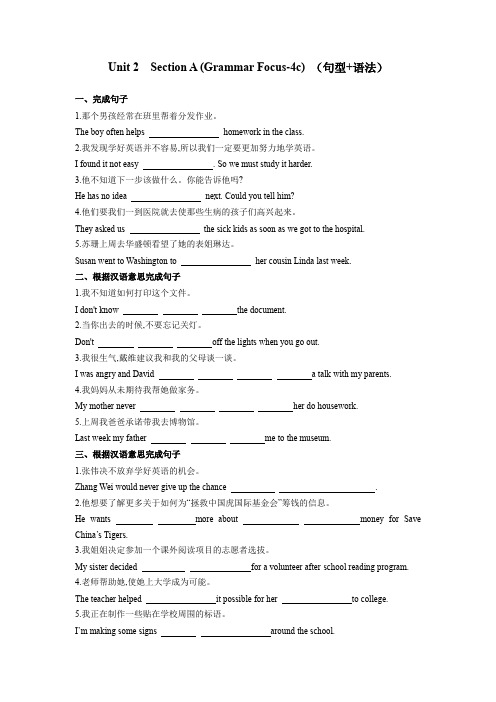
Unit 2 Section A (Grammar Focus-4c) (句型+语法)一、完成句子1.那个男孩经常在班里帮着分发作业。
The boy often helps homework in the class.2.我发现学好英语并不容易,所以我们一定要更加努力地学英语。
I found it not easy . So we must study it harder.3.他不知道下一步该做什么。
你能告诉他吗?He has no idea next. Could you tell him?4.他们要我们一到医院就去使那些生病的孩子们高兴起来。
They asked us the sick kids as soon as we got to the hospital.5.苏珊上周去华盛顿看望了她的表姐琳达。
Susan went to Washington to her cousin Linda last week.二、根据汉语意思完成句子1.我不知道如何打印这个文件。
I don't know the document.2.当你出去的时候,不要忘记关灯。
Don't off the lights when you go out.3.我很生气,戴维建议我和我的父母谈一谈。
I was angry and David a talk with my parents.4.我妈妈从未期待我帮她做家务。
My mother never her do housework.5.上周我爸爸承诺带我去博物馆。
Last week my father me to the museum.三、根据汉语意思完成句子1.张伟决不放弃学好英语的机会。
Zhang Wei would never give up the chance .2.他想要了解更多关于如何为“拯救中国虎国际基金会”筹钱的信息。
He wants more about money for Save China’s Tigers.3.我姐姐决定参加一个课外阅读项目的志愿者选拔。
八年级英语下册Unit2I used to be afraid of the dark 知识讲解

八年级英语下册Unit2I used to be afraid of the dark 知识讲解Unit2Iusedtobeafraidofthedark学习目标:1.学会表达自己现在和过去在外表、性格、娱乐等方面的变化2.学会陈述自己过去常做的事情3.学会表达自己过去的爱好等4.学会谈论过去害怕什么5.能够表达朋友、家人等现在和过去的变化一、词汇(1)基础词汇:usedto曾经dark黑暗spider 蜘蛛insect 昆虫sure 无疑,确实chew 嚼,咀嚼gum 口香糖comic 连环漫画right 立即,马上beafraidof害怕做…beinterestedin对…感兴趣beterrifiedof对感到恐惧(2)词汇复习shorthair 短发curlyhair 卷发longhair 长发straighthair 直发tall 高的short 矮的(be)mediumheight 中等身高thin 瘦的heavy 重的,沉的amediumbuild 中等胖瘦二、日常用语1.Iwasn’tveryoutgoing. 我性格不是非常外向。
2.youusedtohavelonghair. 你曾经梳着长头发。
3.---Didyouusetohavestraighthair?你曾经留长头发吧?---yes,Idid. 是的,我曾。
4.—Didyouusetohavestraighthair? 你过去是直发吗?—yes,Idid. 是的。
5.—Didyouusetoplaythepiano? 你过去弹钢琴吗?—No,Ididn’t. 不,我不弹。
6.IusedtobeshortwhenIwasyoung.我年轻时个子很矮7.Iusedtobeafraidofdark. 我过去害怕黑暗。
8.I’mterrifiedofthesnakes.我害怕蛇。
9.—Didyouusetobeafraidofbeingalone?你过去害怕独自一人呆着吗?—yes,Idid. 是的,我怕。
人教新目标八年级英语下册Unit 2 知识点总结
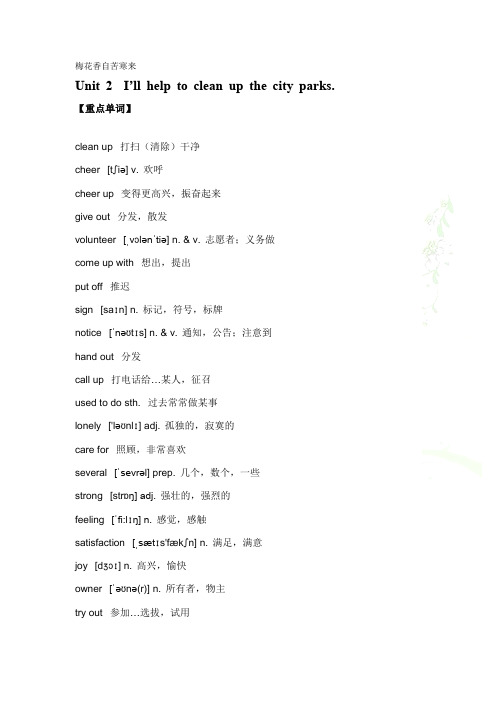
梅花香自苦寒来Unit 2 I’ll help to clean up the city parks.【重点单词】clean up 打扫(清除)干净cheer [tʃiə] v. 欢呼cheer up 变得更高兴,振奋起来give out 分发,散发volunteer [ˌvɔlənˈtiə] n. & v. 志愿者;义务做come up with 想出,提出put off 推迟sign [saɪn] n. 标记,符号,标牌notice [ˈnəʊtɪs] n. & v. 通知,公告;注意到hand out 分发call up 打电话给…某人,征召used to do sth. 过去常常做某事lonely ['ləʊnlɪ] adj. 孤独的,寂寞的care for 照顾,非常喜欢several [ˈsevrəl] prep. 几个,数个,一些strong [strɒŋ] adj. 强壮的,强烈的feeling [ˈfi:lɪŋ] n. 感觉,感触satisfaction [ˌsætɪs'fækʃn] n. 满足,满意joy [dʒɔɪ] n. 高兴,愉快owner [ˈəʊnə(r)] n. 所有者,物主try out 参加…选拔,试用journey ['dʒɜ:nɪ] n. (尤指长途)旅行,行程raise [reɪz] v. 抬起,举起,筹集,征集alone [əˈləun] adv. 独自地,孤独地repair [riˈpɛə] v. 修理,修补fix [fiks] v. 修理,安装fix up 修理,修补give away 赠送,捐赠take after (外貌或行为)像broken ['brəʊkən] adj. 破损的,残缺的wheel [wi:l] n. & v. 轮子,车轮;旋转letter [ˈletə] n. 信件,字母Miss [mɪs] n. 小姐set up 建立,设立disabled [disˈeibəld] adj. 有残疾的,丧失能力的make a difference 影响,有作用blind [blaɪnd] adj. 盲的,盲目的,失明的deaf [def] adj. 聋的imagine [ɪˈmædʒɪn] v. 想象,设想difficulty ['dɪfɪkəltɪ] n. 困难open [ˈəʊpən] v. 打开door [dɔ:] n. 门carry ['kærɪ] v. 携带,搬运train [treɪn] v. 训练,培养training [ˈtreɪnɪŋ] n. 训练,培训excited [ɪkˈsaɪtɪd] adj. 激动的,兴奋的kindness [ˈkaɪndnəs] n. 仁慈,善良,亲切,善意clever [ˈklevə] adj. 聪明的,机灵的understand [ˌʌndəˈstænd] v. 懂,理解change [tʃeɪndʒ] n. & v. 改变interest ['ɪntrəst] n. & v. 感兴趣;兴趣sir [sɜ:(r)] n. 先生madam ['mædəm] n. 夫人,女士【重点短语】1.Clean-Up Day 清洁日2. an old people’s home 养老院3. help out with sth. 帮助解决困难4. used to 过去常常......5. care for 关心;照顾6. the look of joy 快乐的表情7. at the age of 在......岁时8.clean up 打扫(或清除)干净9. cheer up (使)变得更高兴;振奋10. give out 分发;散发11. come up with 想出;提出12. make a plan 制订计划13. make some notices 做些公告牌14. try out 试用;试行15. work for 为…工作;为…. 效力16. put up 建造;举起;张贴17. hand out 分发;散发;发给18. call up 打电话;召集19. put off 推迟;延迟20. for example 比如;例如21. raise money 筹钱;募捐22. take after 与......相像;像23. give away 赠送;捐赠24. fix up 修理;修补;解决25. be similar to 与……相似26. set up 建立;设立27. disabled people 残疾人28. make a difference 影响;有作用29. be able to 能够30. after-school reading program 课外阅读项目【重点句型】1. The boy could give out food at the food bank. 这个男孩可以在食品救济站分发食物。
Unit 2 Section A 3a~4c语法知识点汇总人教版八年级下册英语

unit2 Section A 3a~4c一、不定式to do ~1、常见加不定式的动词有:想要拒绝忘记(want, refuse, forget)需要努力学习(need, try, learn)选择同意志愿(choose, agree, volunteer )希望决定开始(hope/wish/expect, decide, begin/start) 2、这些情况下to可以省略1)使役动词:let / make / have(不定式省略to)let sb do sth= make sb do sth= have sb do sth 使某人做某事、让某人做某事Eg、He make me wash my clothes.他让我洗衣服。
2)感官动词(三眼、两耳、一注意、一感觉)see sb do ~看到某人经常做什么、看到某人做了什么3)help sb do sth(省略to)= help sb to do sth3、常见的不定式做宾补My mother helps me to wash my clothes.(不定式做宾补)I saw him play basketball yesterday .(省略to的不定式做宾补)二、不定式不定式做主语,看做单数,可以用it代替To know yourself is difficult. 不定式做主语,看做单数。
is difficult to know yourself.作主语时,用it代替,真正的主语放后面。
二、常见短语raise money筹钱Stop doing ~停止正在做的事;Stop to do ~ 停下来去做某事;try to do sth努力做某事;try doing sth 尝试做某事After-school study program课后学习计划give up 放弃animal doctor 兽医hand out 分发such a strong feeling of satisfaction = so strong a feeling of satisfaction如此强烈的一种满足感look of joy on one’s face某人脸上喜悦的表情at the age of ... 在······岁时;try out 参加······选拔;试用go on a different journey 进行一次不同的旅行go on进行,继续; a dream come true 梦想成为现实;梦想成真Put off making a plan推迟制定计划;lover 爱好者,爱人at the same time同时;primary school 小学;a good way 一个好的方式四、each和every 形容词:每一个each 强调个体,每一个every 强调整体,所有人Each student has a book. 每一个学生都有一本书。
人教版八年级下册英语Unit 2单元语法知识点总结

人教版八年级下册英语Unit 2单元语法知识点总结本单元重点短语的具体用法1. clean up:打扫(或清除)干净- We need to clean up the classroom before the teacher comes. 我们需要在老师来之前把教室打扫干净。
2. cheer up:(使)变得更高兴;振奋起来- Let's cheer up and look forward to the future. 让我们振作起来,展望未来。
3. give out:分发;散发- The volunteers are giving out food to the homeless. 志愿者们正在向无家可归者分发食物。
4. come up with:想出;提出(主意、计划、回答等)- She came up with a great idea to solve the problem. 她想出了一个很好的解决问题的主意。
5. put off:推迟- We had to put off the meeting because of the bad weather. 由于天气恶劣,我们不得不推迟会议。
6. hand out:分发- The teacher asked me to hand out the papers. 老师让我分发试卷。
7. call up:打电话给(某人);征召- I need to call up my friend to discuss the project. 我需要给我的朋友打电话讨论这个项目。
8. used to:曾经……;过去…- He used to be a teacher, but now he works in a company. 他过去是一名老师,但现在在一家公司工作。
9. care for:照顾;非常喜欢- She cares for her elderly parents very much. 她非常照顾她的年迈父母。
(完整版)八年级英语下册第二单元知识点

Unit 2 I'll help to clean up the city parks一、基本知识点1. sick 生病的,有病的;可在句中作表语Mary could not come because she is sick。
也可作定语a sick child【区别ill】ill与sick同义;但是只在句中做表语,不做定语。
Mary could not come because she is ill.2. cheer (sb.) up(让某人)变得高兴;振奋起来The good news cheered up everyone in our class。
3。
give out分发;散发,相当于hand out,The teacher is giving out/ handing out the test papers.give sth。
out to sb。
意为。
4. volunteer【名词】志愿者【动词】义务做,自愿做(某事)volunteer to do sth. ,The girls could volunteer in an after—school study program.5。
used to do sth。
过去/曾经(常)做某事,表示过去的习惯、动作或状态,并强调现在已经不再存在或发生。
There used to be a cinema here.They told me stories about the past and how things used to be.6. alone【形容词】独自一人的,无感情色彩:The musician enjoyed living alone and writing songs himself。
lonely (感到)孤独寂寞的,带有很强的感情色彩,可做表语或定语。
The lonely boy is not lonely now.7. care for sb./sth.照顾;照料……care【名词】小心,关心take care of=look after →【动词】care about sb./sth。
期中备考-人教版八年级下册unit 2核心考点归纳(语法+短语+语句分析)

期中备考-人教版八年级下册unit 2核心考点总结归纳【语法】一、作主语为避免句子头重脚轻,常用it作为形式主语,而真正主语--动词不定式后置。
常用句型:It takes sb. some time to do sth.It +be+adj./n.+(for/of sb.) to do sth.(此句型注意使用介词for和of的区别:用“for”时表示“对于某人来说,做某事是怎样的”,此时的形容词修饰sth;用“of”时表示“某人做某事,某人是怎样的”,此时的形容词修饰sb.)Eg.It took me three hours to finish my homework.It’s difficult for me to finish this alone.It’s kind of you to help me when I was in trouble.二、作宾语动词agree ;offer ;intend,plan ;help;prepare ;decide ;refuse ;choose ;wish,hope,want,expect ;fail ;demand,ask (要求);promise (答应);pretend (假装);dare (敢于);manage (设法做成);determine (决心)等后面常接动词不定式作宾语。
【记忆口诀】同意提出做计划,要求答应来帮忙。
准备决定遭拒绝,敢于选择有希望。
不能做到莫假装,设法做成决心强。
Eg.I plan to go to Sydney together with my parents next week.三、作(后置)定语“have/has+sth.+to do”或“enough+名+to do” “It’s time to do sth.” 等结构。
Eg.I have something important to do.It’s time to tidy up your own room.四、作宾语补足语tell, ask, want, invite, teach, like, call等可接带to的动词不定式作宾语补足语,构成tell/ask/want /call/invite sb. to do sth.结构。
Unit2词汇、短语、语法知识点梳理及拓展 人教版英语八年级下册
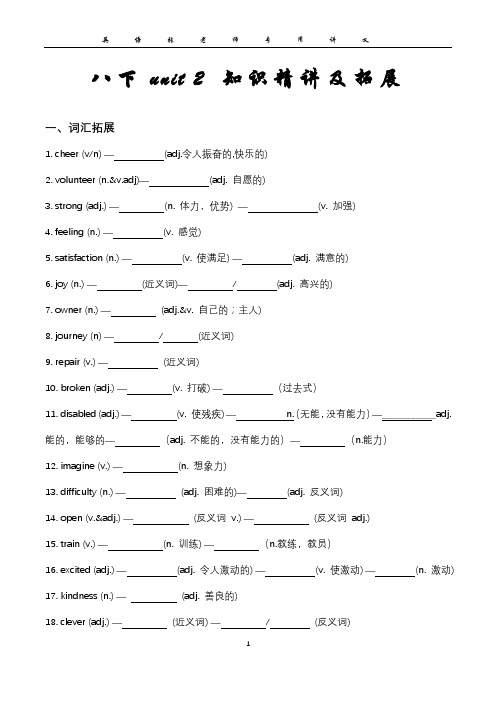
八下unit 2 知识精讲及拓展一、词汇拓展1.cheer (v/n) —(adj.令人振奋的,快乐的)2.volunteer (n.&v.adj)—(adj. 自愿的)3.strong (adj.) —(n. 体力,优势) —(v. 加强)4.feeling (n.) —(v. 感觉)5.satisfaction (n.) —(v. 使满足) —(adj. 满意的)6.joy (n.) —(近义词)—/ (adj. 高兴的)7.owner (n.) —(adj.&v. 自己的;主人)8.journey (n) —/ (近义词)9.repair (v.) —(近义词)10.broken (adj.) —(v. 打破) —(过去式)11.disabled (adj.) —(v. 使残疾) —n.(无能,没有能力)—_____________adj.能的,能够的—(adj. 不能的,没有能力的)—(n.能力)12.imagine (v.) —(n. 想象力)13.difficulty (n.) —(adj. 困难的)—(adj. 反义词)14.open (v.&adj.) —(反义词v.) —(反义词adj.)15.train (v.) —(n. 训练) —(n.教练,教员)16.excited (adj.) —(adj. 令人激动的) —(v. 使激动) —(n. 激动)17.kindness (n.) —(adj. 善良的)18.clever (adj.) —(近义词) —/ (反义词)19.understand (原形)—_____ (过去式) —_____ (过去分词)—_______________ (adj. 善解人意的)20.interest (n.&v.)—(adj. 令人感兴趣的) —(adj. 感到感兴趣的)21.change (v.)—(adj. 可变的,易变的) —(adj. 多变的,变化无常的) —n. —(v. 交流,交换)二、短语复习1. 关心;照顾____2. 养老院___3. 帮助解决困难__4. 曾经… 过去__5. 在......岁时_____6. 打扫(或清除)干净7. (使)变得更高兴;振奋8. 分发;散发__ 9. 想出;提出____ 10. 制订计划__ 11. 一种强烈的满足感12. 试用;参加…选拔13. 为…工作;效力14. 实现___________ 15. 建造;举起;张贴16. 筹钱;募捐__ 17. 与此同时____ 18. 在某人空闲的时候19. 打电话;召集___ 20. 推迟;延迟____ 21. 与......相像;像____ 22. 赠送;捐赠_23. 修理;修补;解决24. 与……相似___ 25. 影响;有作用___ 26. 建立,设立__ 27. 对…感到兴奋____ 28. 能够做某事__ 29. 自愿做什么____ 30. 建起,设立__三、知识详解1. help v 帮助→___________adj 有益的,愿意帮助的,→___________adj无帮助的常见短语有:1)._______________________. 帮助某人做某事。
英语八年级下册unti2知识点
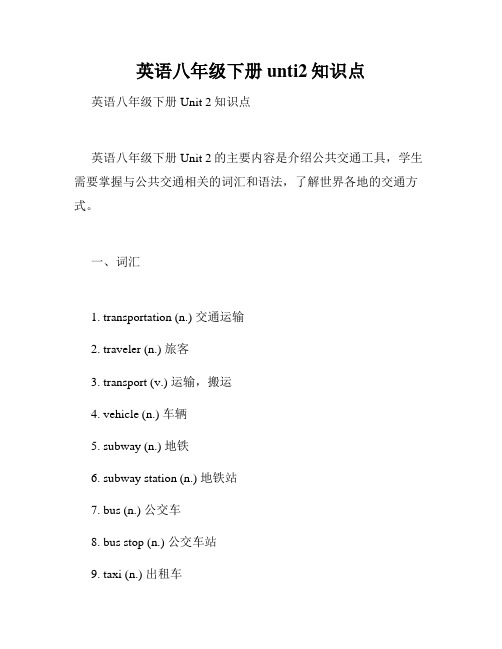
英语八年级下册unti2知识点英语八年级下册Unit 2知识点英语八年级下册Unit 2的主要内容是介绍公共交通工具,学生需要掌握与公共交通相关的词汇和语法,了解世界各地的交通方式。
一、词汇1. transportation (n.) 交通运输2. traveler (n.) 旅客3. transport (v.) 运输,搬运4. vehicle (n.) 车辆5. subway (n.) 地铁6. subway station (n.) 地铁站7. bus (n.) 公交车8. bus stop (n.) 公交车站9. taxi (n.) 出租车10. bridge (n.) 桥11. intersection (n.) 十字路口12. pedestrian (n.) 行人13. traffic light (n.) 交通灯14. highway (n.) 高速公路15. tram (n.) 有轨电车二、语法1. 现在进行时现在进行时用来描述正在进行的动作或状态,结构为 be + 动词+ ing,例如:I am taking the subway to work. 我正在坐地铁去上班。
They are walking to the bus stop. 他们正在步行去公交车站。
2. 一般现在时一般现在时用来描述经常性或习惯性的动作或状态,结构为主语+动词原形,例如:She usually takes the bus to school. 她通常乘公交车去上学。
The traffic light turns red. 交通灯变为红色。
3. 介词 in 和 on 的用法in 用来表示在某个范围之内,例如在一年中的某个月份、某个季节等,例如:I usually travel in the summer. 我通常在夏天旅行。
He studies in the library. 他在图书馆学习。
on 用来表示在某个表面上,例如在地图、日历、时间上,例如:She marked the date on the calendar. 她在日历上标记了日期。
Unit2词汇,短语,语法归纳人教版八年级英语下册
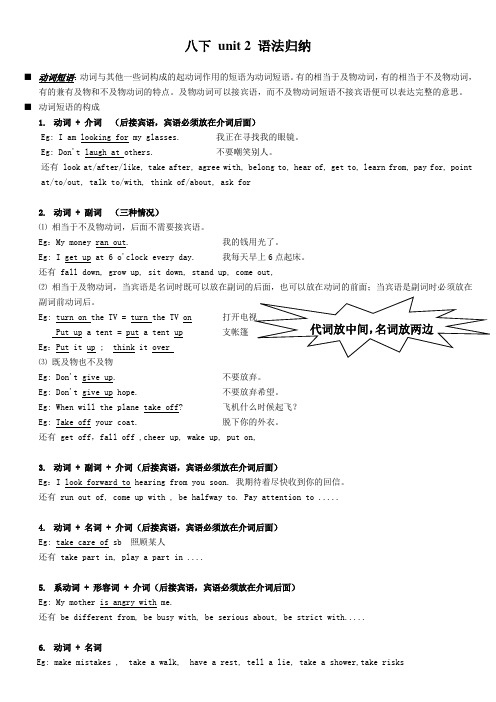
八下unit 2 语法归纳■动词短语:动词与其他一些词构成的起动词作用的短语为动词短语。
有的相当于及物动词,有的相当于不及物动词,有的兼有及物和不及物动词的特点。
及物动词可以接宾语,而不及物动词短语不接宾语便可以表达完整的意思。
■动词短语的构成1.动词 + 介词(后接宾语,宾语必须放在介词后面)Eg: I am looking for my glasses. 我正在寻找我的眼镜。
Eg: Don't laugh at others. 不要嘲笑别人。
还有 look at/after/like, take after, agree with, belong to, hear of, get to, learn from, pay for, point at/to/out, talk to/with, think of/about, ask for2.动词 + 副词(三种情况)⑴相当于不及物动词,后面不需要接宾语。
Eg:My money ran out. 我的钱用光了。
Eg: I get up at 6 o'clock every day. 我每天早上6点起床。
还有 fall down, grow up, sit down, stand up, come out,⑵相当于及物动词,当宾语是名词时既可以放在副词的后面,也可以放在动词的前面;当宾语是副词时必须放在Eg: turn on the TV = turn the TV onPut up a tent = put a tent up 支帐篷Eg:Put it up ; think it over⑶既及物也不及物Eg: Don't give up. 不要放弃。
Eg: Don't give up hope. 不要放弃希望。
Eg: When will the plane take off? 飞机什么时候起飞?Eg: Take off your coat. 脱下你的外衣。
人教版八年级英语下册unit 2 知识点+语法情态动词.ppt
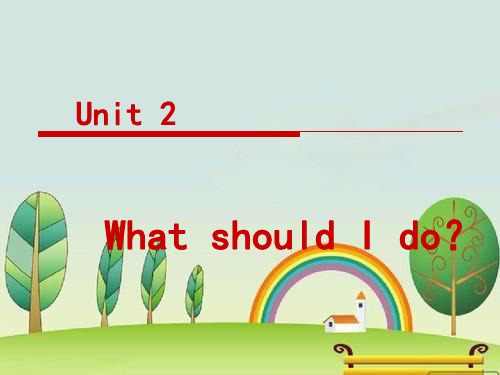
【答案与解析】A。 情态动词可表达建议、要求、 可能和意愿I’d love to.是“我很乐意”; Never mind. 是“不介意”;It doesn’t matter. 是“没关系”; 只有A符合题意。
小试牛刀
There ________ more people in the next 5 years. A. is B. are C. will have D. will be
情态动词表示“可能”或“预测”
will 和 would 用于表示“预测”或“习惯性”: 1. I think he will be all right now. (will be 表 示一定会) 我想他现在一定好了。
2. That would be his mother. (would be 表示 肯定是)那肯定是他母亲。
【答案与解析】B。因为是与朋友吵架了,所以应该说对不起。 should是情态动词,它的基本用法是必须和其他动词一起构成 谓语。情态动词没有人称和数的变化,意为“应该……”。 should(应当,应该)用于所有人称,表示劝告或建议。因此 选B。
小试牛刀
— Will you please stay here for the party?
maybe一般放在句首,引导句子。may be由情态动词may 加系动词原形be构成。其后所接词决定于be,可以是名词、 形容词等,一般放在句中。
Maybe he is John’s father. 也许他是约翰的父亲。 He may be a student. 也许他是一名学生。
知识点
call up…表示“打电话…”可以与名词、代 词连用。连接代词时,把代词放在call与up 之间。 Please call me up. Don’t forget to call up your uncle
人教版八年级英语下册第二单元重点知识点梳理
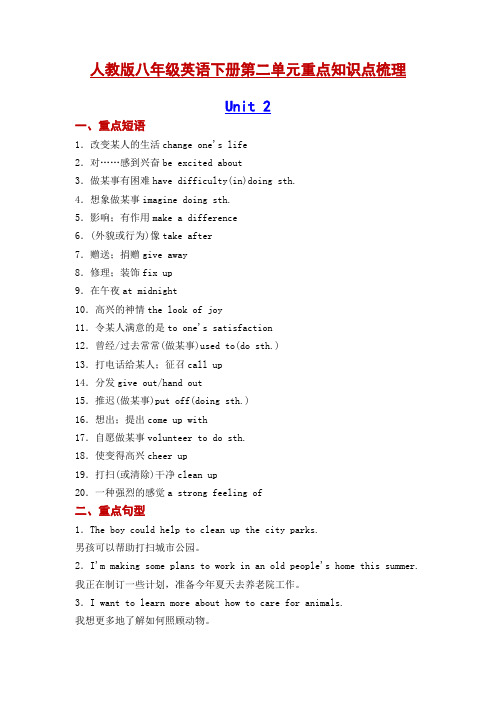
(2)作不及物动词,如:
Something unexpected has turned up.出现了令人意外的情况。
(3)既可作及物动词又可作不及物动词,如:
你的帮助使我拥有Lucky成为可能。
三、重点语法
动词短语
动词短语就是有些动词可以和一些别的词构成短语(以动词为中心),表达一个概念,其作用和一个单独动词差不多的一种固定搭配。在实际使用中,通常会把动词短语当成一个整体。
动词短语有以下常见类型:1. Nhomakorabea词+副词
(1)作及物动词,如:
He brought up his children strictly.
The barrel of gunpowder blew up.(不及物)火药桶爆炸了。
The soldiers blew up the bridge.(及物)士兵们把桥炸毁了。
2.动词+介词
动词与介词构成的词组在词义上相当于一个及物动词,宾语总是在介词后面,如:
I don't care for television.我不很喜欢电视。(care for=like)
3.动词+副词+介词
在这类动词短语中,动词、副词、介词紧密结合,是动副词组和动介词组的合成体,词义上相当于一个及物动词。它兼有以上两类短语动词的特点,但宾语总是位于介词之后,如:
get on/along with(与……相处)catch up with(赶上,跟上)
We must work hard to make up for the lost time.
- 1、下载文档前请自行甄别文档内容的完整性,平台不提供额外的编辑、内容补充、找答案等附加服务。
- 2、"仅部分预览"的文档,不可在线预览部分如存在完整性等问题,可反馈申请退款(可完整预览的文档不适用该条件!)。
- 3、如文档侵犯您的权益,请联系客服反馈,我们会尽快为您处理(人工客服工作时间:9:00-18:30)。
If the room is dirty, you should
You should
If you don’t know the way, you should
If you are too fat, you should
should
表示一种建议,是一个情态动词。 (课外拓展) a.表示应该做,而且有一种道义上的责任。 b.表示明显的结果或者合理的推断,且所期待的事 几乎是事实。 c.在疑问句中,它表示不合理,难于相信或者不应 该之事,意思是“竟会”。
8. lots of 许多,大量,可修饰可数与不可数名词。
Section A 1b
Girl 1: You look unhappy. What’s wrong? Girl 2: Oh…my clothes are out of style. I don’t
look cool. Girl 1: Well, maybe you should buy some new
clothes. Girl 2: Yes, but I don’t have enough money. Girl 1: Huh. Maybe you could get a part-time job in the
evenings. Girl 2: I can’t, because my parents want me to stay at
2. My clothes are out of style. 我的衣服过时了。 out of style “过时的,落伍的”
3. maybe, may be表示“可能,也许” 表示推测。maybe一般 放在 句首,引导句子。may be由情态动词may加系动词原形be构 成。其后所接词决定于be,可以是名词、形容词等,一般放 在句中。 Maybe he is John’s father. 也许他是约翰的父亲。 He may be a student. 也许他是一名学生。
Unit 2
I often feel very tired. What should I do?
You look worried. What’s the matter?
The car is dirty. You should
If you are ill, you should
If you are thirsty, You should
home every night. I argued with them about it.
Girl 1: Well, you shouldn’t argue with your parents. You should talk about your problems.
Girl 2: And guess what else is wrong? Girl 1: What? Girl 2: My brother plays his CDs too loud! I can’t go
to sleep.
Section A 2a
Boy 1: Hey, Peter, what’s wrong? Boy 2: I had an argument with my best friend.
What should I do? Boy 1: Well, you could write him a letter. Boy 2: I don’t think so. I don’t like writing letters. Boy 1: Maybe you should call him up. Boy 2: No, I don’t want to talk about it on the phone. Boy 1: Well, you should say you’re sorry. Boy 2: Yes, I know I should, but it’s not easy. Boy 1: Maybe you could go to his house.
money. 1. You_c__o_u_l_d__/should write him a letter. 2. You could/_s_h_o_u__ld__call him up. 3. You could/_sh__o_u_l_d__say you’re sorry. 4. You_c__o_u_l_d_/_should go to his house.
Boy 2: I guess I could, but I don’t want to surprise him. Boy 1: Hey, I know. You could give him a ticket to a ball
game. Boy 2: Well, that’s a good idea, but I don’t have enough
6. ask for 要求,索要,完整形式为ask sb for sth 向某人要某物 Please ask him for the book. 请向他要那本书。
7. be angry with 对…生气, 注意be动词及介词with Jim is angry with me. 吉姆生我气了。 get on 相处, get on well 相处融洽 get on well with sb 与某人相处融洽 have a fight with sb 与…打架
writing
Li Lei’s parents often argue. He doesn’t know what to do. Please give him some advice.
知识点
1. argue with 与某人争吵 I don’t want to argue with him. 我不想和他吵架。
4. call up…表示“打电话…”可以与名词、代词连用。连接代词 时,把代词放在call与up之间。 Please call me up. Don’t forget to call up your uncle.
5. on the phone 用/通过电话 I want to know the weather on the phone. 我想通过电话查一下 天气。
